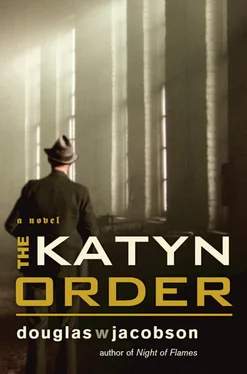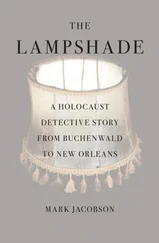Adam wandered away and plodded along Podwale Street, dead tired, every bone in his body aching. He finally stopped and slumped down on the steps of a three-story building with black shutters and a red tile roof that was still mostly intact except for a ragged hole about a meter in diameter near the chimney. He thought wearily that an unexploded shell was probably lying somewhere inside the house.
The enemy Panzers and infantry units had pulled back for the night, and—except for scattered artillery fire—the area was quiet, at least for the moment. He pulled his last cigarette from the soggy, crumpled pack and lit it, staring at the purple sky, illuminated on and off by exploding shells like flashbulbs from a thousand cameras. A haze hung over the area, heavy with the acrid smell of smoke and ammonia. How much longer? he wondered.
He had killed thirteen German soldiers today, at least eight of them officers as far as he could tell. How many did that make in all since he was dropped into Poland by parachute on a bitterly cold night in the winter of 1940? He’d kept track at first, but lost count somewhere over a hundred. Maybe it was two hundred by now, all of them easily justified in his law student’s mind as a casus belli —justification for acts of war—a principle upheld for centuries in most civilized societies.
He took a long drag on the cigarette thinking of the insanity of civilized societies clinging to some legal principle as an argument for the slaughter of millions of people. And it was equally insane, he knew, to have devoted years of his life to the study of law, the guiding principles of humanity in an enlightened world—then to become an assassin. The more he thought about it, sitting on the steps of a house with a hole in the roof, in a city about to be destroyed by a ruthless enemy, he decided that justification was irrelevant. Simple revenge might be more to the point.
At least Colonel Whitehall would be pleased, he supposed. He imagined the portly, disheveled officer of the SOE, Britain’s covert organization for sabotage behind enemy lines, smiling that complacent smile of his. Adam had been one of Whitehall’s first recruits. At the time he had been desperate to exact revenge on those who had taken everything from him: his home, the only family he ever knew, the hard-won freedom of his birth country. And Whitehall had been more than pleased to provide him with the training and means to carry out that revenge.
Adam thought about Natalia—the Conductor, as Rabbit had called her—and the question she’d asked still nagged at the back of his mind. You came back… what on earth for? It was a simple question from a very straightforward woman. Yet it was a question that resurrected distant memories of another world, in what now seemed like a lifetime ago. Another world when he had reunited with his Polish family: the aunt who’d cared for him and raised him as a child, the uncle who’d been a second father to him, mentored him and taught him the most important values in life. They were memories he’d buried a long time ago, the day when that world was abruptly shattered.
Adam was jerked back to the moment when he heard someone shouting. It was a woman’s voice, shrill, panicky—and familiar. He got to his feet, slung the rifle over his shoulder and jogged back down Podwale, following the voice toward the demolished schoolhouse.
Natalia stood on top of the rubble pile shouting at two AK commandos. The commandos slowly backed away, shaking their heads. “Get back here and help me, Goddamn it!” she shrieked. “We’ve got to find her!”
Adam hesitated for a moment then tossed the cigarette on the ground, climbed over the rubble and touched her shoulder. “Natalia—”
She spun around like she’d received an electrical shock. “Wolf?” She took a step back and looked around, thrusting her hands in the air. “What the hell happened?”
“A tank attack, about three hours ago. We—”
“It was a hospital!”
“I know. I was—”
“A hospital… with a big red cross painted on the door!”
“I know, I—”
“They’re monsters! Goddamn them to hell! They’re nothing but…” She ripped off her cap and slapped it hard against the side of her leg, stomping around in a tight circle on top of the debris pile. “We left her here so she’d be safe! We left her and… now this.” She stopped and clenched her fists.
Adam put both hands on her shoulders and looked into her contorted face. “Natalia,” he whispered. “Natalia, I know. I was here.”
A tear trickled down her bruised cheek. “But it was a hospital!”
“Yes, I know,” he said, uncertain what more to say. “It was tragic, but we’ve all seen it before… you’ve seen worse than—”
“Not when it was my friend!” she hissed.
“Your friend? I didn’t—”
“No, of course not! How could you? Her name was Berta, and… Oh Christ, I’m just—”
An artillery shell screeched overhead, and Adam instinctively pulled her close as it exploded with a numbing blast a half block away. He looked around the rubble-strewn area, trying to recall a place where they might escape the line of fire. He took her elbow and led her off the debris pile, across the grassy area and to a breach in the city wall.
She stopped. “No, I’ve got to go back. I’ve got to find her.”
He tightened his grip on her elbow. “She’s gone.”
She looked at him for a long silent moment, then turned away and ducked through the breach.
On the other side of the wall they rounded a corner onto Piekarska Street, a narrow, cobbled lane of brick and stucco buildings, once populated by a number of bakeries. They jogged down the street, past the only one that managed to stay open a day or two a week, until they came to an arched doorway that led to a staircase.
Feeling his way in the dark, with one hand on damp, moss-covered bricks, Adam led the way down a long flight of wooden steps. At the bottom he spotted a faint light emanating from a deep cellar few people knew existed. He took Natalia’s hand and led her silently through a narrow tunnel, following the light.
27 AUGUST
THE CELLAR WAS A SUBTERRANEAN CAVERN about ten meters square, constructed of rough stone walls that arched upward, forming a domed ceiling. The room was illuminated by a single kerosene lantern nailed to a thick center post that Adam guessed had been added at some point to help support the ceiling. Stacked against one of the brick walls were a dozen wooden crates of ammunition. Adam had been here once before, shortly after the AK transferred the weapons they’d captured at the warehouse on Stawki Street. At that time, the room had been full.
Two commandos, who had entered the room from a second tunnel, looked at them curiously then picked up one of the wooden crates and carried it out.
Natalia leaned back against one of the stone walls. She sighed, then slid down and sat on the dirt floor.
Adam’s exhaustion returned with a rush, and he slumped down next to her. He removed his glasses and rubbed his eyes, irritated from the smoke and dust. “We should be safe here for a while, unless they drop one of those screaming cows on us.”
Natalia nodded. She sat for several minutes, barely moving, staring at the dirt floor. Finally, without looking up, she said softly, “Do you have any friends, Wolf?”
The question took him by surprise. He glanced at her then looked away, suddenly wishing he had a cigarette. Friends? He could barely remember a time when he had friends. He’d had friends when he was a boy, first in Krakow and then in America. And he had friends—acquaintances, actually—at Jagiellonian University where he’d resumed his study of law after returning to Krakow. But that was before the war started and most of them—and what was left of his family—were arrested by the SS, and he was deported from Poland. It was before Whitehall recruited him in London and arranged for his “training,” then sent him off on his solitary mission of murder. “No, I don’t have any friends,” he said quietly.
Читать дальше












